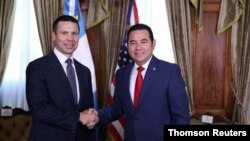A nascent immigration deal between the United States and Guatemala continued to take shape Thursday, as the U.S. Homeland Security acting secretary visited the impoverished Central American nation.
According to reports, Kevin McAleenan and Guatemalan officials outlined details of the safe third country agreement signed between the United States and Guatemala five days ago.
Under the new deal, the Trump administration is planning to send asylum-seekers from Honduras and El Salvador back to Guatemala to process their requests for help outside the U.S. Their claims would not initially go through the U.S. immigration courts.
Phased in approach
McAleenan said the plan is expected to start slowly, with single adults and not children.
"We're working on the details … and ensuring that the Guatemalans understand that we're talking about a phased and measured approach to implementation that will not overwhelm Guatemalan resources and will be supported by U.S.-funded international organization capacity," he said in an interview reported in The Washington Post.
Those who claim fear of return to their home country would still be eligible for a lesser form of protection, "withholding of removal," which requires a much higher burden of proof and doesn't lead to legal permanent residency.
Homeland Security officials did not respond to VOA requests for comment.
After meetings with Guatemalan President Jimmy Morales and other officials, McAleenan told reporters the agreement is part of an effort to address human trafficking and strengthen checkpoint controls.
Obstacles in Guatemala
Under the accord, the U.S. would also invest $40 million in Guatemala to increase its asylum system capacity for people who need protection, as well as create more work visas, reports said.
But there are still obstacles facing the agreement. The plan needs to be approved by the Guatemalan Congress. The Guatemalan presidential runoff election is scheduled for Aug. 11, and both candidates, Sandra Torres and Alejandro Giammattei, have shared criticism about the way in which the Trump administration pressured the current Guatemalan president to agree with the terms.
Last month, U.S. President Donald Trump said he would institute tariffs, fees and travel restrictions that could have sent the Central American country into ruin if Guatemala did not sign an agreement with the United States.




